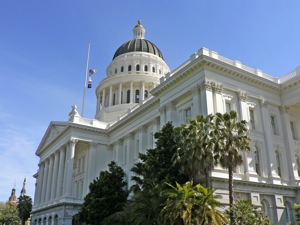
Every government institution has its peculiar traditions. Lawyers in English courts still wear wigs. White House press conferences always end with a “Thank you, Mr. President” from the senior correspondent. And on the floor of the state Assembly, if you want to speak, you signal that by raising your microphone on its flexible stalk.
On July 5, the day following Independence Day, the state Assembly debated Sen. Mark Leno’s FAIR (Fair, Accurate, Inclusive and Respectful) Education Act, SB 48, of which I am a principal co-author. The FAIR Education Act requires schools to include the history of the LGBT civil rights movement and the contributions of the LGBT community in school curricula. It would correct the near-invisibility of LGBT people in textbooks and instruction, promote school safety and enhance self esteem for LGBT students.
Despite the positive goals of SB 48, the floor debate began with several dismayingly ignorant and offensive comments. But here’s where the peculiar tradition comes in. Just as I was beginning to experience that sinking feeling I always get when our community is under attack, I realized that a veritable forest of microphone stalks had been raised around me. It is unusual for more than a few assemblymembers to speak on a bill, but the reaction of my colleagues to the bill’s opponents was powerful. One after another, assemblymembers from around the state stood to speak in support of inclusion and fairness and respect for LGBT people. It was profoundly moving.
The FAIR Education Act passed 49-25 and was sent to the governor. What a powerful way to kick off the month in which we celebrate LGBT Pride here in San Diego!
One important reason for this shift in attitudes is the growth of the legislative LGBT Caucus. Last month, in the state capitol rotunda there was a Pride month display featuring all seven of our members. The 2010 election nearly doubled the size of our caucus, which is chaired by San Diego state Sen. Christine Kehoe. And we are not merely at the table. In many cases we sit at its head and select the menu. The leader of the assembly, Speaker John Perez, is a gay, Latino man – a first. Sen. Kehoe chairs the powerful Senate Appropriations Committee. Sen. Mark Leno heads Budget and Fiscal Review. Assemblymember Ammiano of San Francisco is chair of Public Safety and Assemblymember Lara of the Los Angeles area is chair of the Joint Legislative Audit Committee. I am honored to have been chosen by Speaker Perez to serve as majority whip, a leadership position in the Democratic Caucus.
Our growing caucus means that a record number of bills impacting the LGBT community have been placed before the legislature. In addition to the FAIR Education Act, there are several proposals to curb anti-LGBT bullying, including Seth’s Law. Other proposed laws protect same-sex couples and their families, ensure equal workplace benefits, improve the LGBT competency of healthcare providers and guarantee that LGBT people are counted when government statistics are gathered. My own Gender Non-Discrimination Act strengthens our state’s anti-bias laws by ensuring that protections based on gender identity and gender expression are explicit and consistent and my bill AB 499 would permit young people to seek preventive care for STDs, including anti-HIV/AIDS treatment.
A key element in moving these proposals forward is the presence of the members of the LGBT Caucus. We can talk to our colleagues about our individual experiences, making the impact of the law real and personal. The floor debate on the FAIR Education Act included heartfelt personal pleas from two gay lawmakers – Assembly Speaker Perez and Assemblymember Ammiano.
But it takes more than seven lawmakers to change the law in a legislature with 120 members. After many years and much hard work by members of the LGBT community, public opinion on everything from marriage equality to military service has shifted in our favor. This is true not only in the traditional gay enclaves of San Francisco or West Hollywood, but throughout the state. A recent study by UCLA’s Williams Institute, which studies LGBT issues, revealed that the California county with the highest percentage of same-sex couples raising children is Tulare County. And other Central Valley communities aren’t far behind.
Last month, along with other members of the LGBT Caucus, I marched in Fresno’s Pride parade. Yes, they have one and, in fact, it is a decades old tradition. While not as big as celebrations in San Francisco or San Diego, it was a substantial affair, with the sidewalks lined with a diverse crowd of cheering spectators. As LGBT people return to live in the places where we grew up or move to fulfill our dreams of a house in the country, we change the attitudes of our new neighbors. And close behind that is a change in how we are viewed by our representatives in government.
More and more, legislators who are not members of the LGBT Caucus carry bills that improve the lives of those in our community. This year, bills that would improve campus climates for LGBT students and school staff were authored by San Diego Assemblymembers Block and Hueso. Long Beach Assemblymember Bonnie Lowenthal has authored a bill to streamline the process for transgender people to obtain a corrected birth certificate. And the list goes on.
This Pride month, there is much to celebrate – marriage equality in New York, the demise of Don’t Ask, Don’t Tell, a federal court’s rejection of the notion that a gay judge cannot fairly preside over an LGBT rights case. But for me, one of this month’s high points will be the memory of all those microphones standing up in support of equality and respect for our community.










